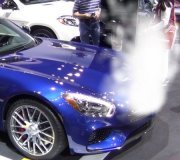1998 Mitsubishi Montero 6 cyl Two Wheel Drive Automatic ~150k miles
Hey guys, I've found a million threads about this same problem with all different vehicles, but never found a conclusive answer.
1998 Montero Sport, V6. Not sure of mileage but somewhere in the mid 100's (not sure if its the original engine).
I'll start with the morning. When I crank my car, big plumes of white/grey smoke come out of the exhaust, and the first few times I accelerate through the neighborhood. It also makes a slight gurgling noise coming from the engine bay.
In between work and school (just city driving) and on the main roadway (holding speeds of around 45 constantly) the car works fine. If I get on the Highway/Interstate though, problems arise. Usually when I hit 70 (for about 2 minutes) it begins to overheat. If I drop down in the right lane to about 55 it goes down, and sometimes turning the heater on helps lower it a bit as well. If it continues for too long (5 minutes) then I start to lose antifreeze. And it goes fast.
I've replaced the: radiator, hoses and clamps, and thermostat and gasket. I've also used 3 different kinds of antifreeze. Any more questions about the situation just let me know!
Thanks!
SPONSORED LINKS
Saturday, October 31st, 2009 AT 12:49 AM



